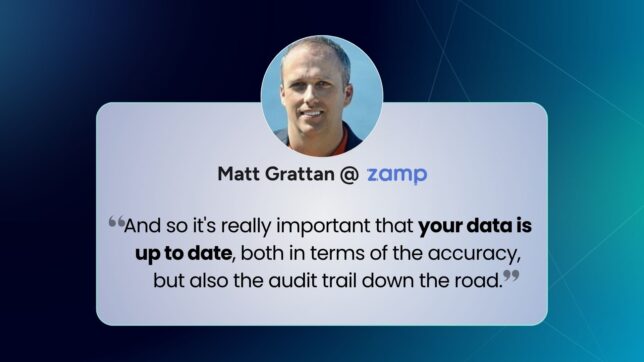
7 Common Mistakes to Avoid With Sales Tax
If you run a business, sales tax is likely something you won’t be able to avoid. Understanding how sales tax works can ensure you stay compliant and help you avoid costly tax mistakes.
Matt Grattan, Head of Sales and Partnerships at Zamp, breaks down the seven most common mistakes you must avoid regarding sales tax.
1. Collecting and Not Registering or Remitting Sales Tax
One of the most significant mistakes seen frequently in the sales tax industry is collecting sales tax in various states without being registered or remitting the funds owed. This is illegal, and unfortunately, it happens from time to time.
It’s something you want to avoid at all costs. When you’ve reached nexus, you want to ensure you register immediately and remit the sales tax owed.
Companies can register with the state’s taxing authority where they’ve reached nexus. Once this is done, start collecting sales tax in that state from the effective date of your registration.
2. Not Filing On Time and Past Due Liabilities
If you’re not filing your sales tax returns on time, you’re facing past-due liabilities and accruing principal and interest. Principal and interest can add up over time, as most states impose penalties and interest when you don’t file on time. Late filing penalties are often 5% to 25% of the tax owed for each month the return is late.
The key is to file on time. If you have any past dues, address them quickly so you don’t accrue that liability.
3. Using Cash vs. Accrual Accounting
The cash vs. accrual accounting conversation is interesting because, for the most part, it’s almost instantaneous. The invoice to cash, processing the payment, and realizing the cash is a very quick process.
However, some companies offer free trials, similar to a non-binding agreement that becomes an annual agreement if the customer moves past the initial 30-day trial. There will likely be significant cancellations after the 30 days.
There could also be situations with insufficient payments where the payment doesn’t go through, and the company can never collect the cash from the customer, even though they recognize the order within the original purchase. Issues with milestones also occur, where software is purchased but paid out over specific milestones.
At Zamp, all our integrations support accrual standards, as the states prefer. However, we do have customers who use a cash basis, where we base sales tax on the data sent to us.
“If you're using cash basis accounting today, look at processes and areas that you can improve in terms of your billing standards and how you're recognizing things. So you can move more toward an accrual standard ideally because I think that will align better with state standards, and investors prefer that as well.” - Matt Grattan, Head of Sales and Partnerships at Zamp
About 99.99% of acquirers will want accrual accounting in place if they are more extensive companies.
4. Quotes Don’t Include Sales Tax
As a business, you may do quoting in your quote-to-cash or order-to-cash process. Customers may be confused if the cost was X and you’re charging them X plus 9% or whatever the rate is. You must tell them upfront because they may not have budgeted for surprise costs.
As a best practice, always include a sales tax estimate or calculation in your quoting process. This will improve the customer experience, as they will know the true costs upfront.
5. Not Collecting Exemption Certificates
Your company may have many exempt buyers tied to the government or resale, but you aren’t collecting exemption certificates. This is low-hanging fruit that an auditor or tax authority will pursue.
If you get a sales tax audit, ensure you’re collecting those exemption certificates and that they are up to date. Some states require you to update them on an annual or biannual basis, and some don’t need it.
Businesses dealing with a lot of exempt customers need a process in place to support them.
6. Bad or Incomplete Customer Data
A classic mistake to avoid with sales tax is having bad or incomplete customer data. This can be tied to many things, including address data. An example is if the address information you have in QuickBooks Online is incomplete or you’re not correctly marking your customers as exempt within your customer master data. Any sales tax service or solution you work with can help.
This is important because it not only supports accurate sales tax calculation based on the location and the customer's exemption or non-exemption, but it also archives and provides an audit trail.
If the state ever audits you, it will want you to take the liability you collected down to the jurisdiction, transaction, and line item levels within each order. You’ll need a snapshot of the flow and why you made those decisions.
So it’s important that your data is up to date, both in terms of accuracy and the audit trail down the road.
7. Don’t Forget About VAT
If you start selling your product, you need to be aware of certain things if you expand to selling software overseas. For example, the European Union (EU) will say that you must start collecting VAT on the first sale.
Now, there are options like the VAT Mini One Stop Shop (MOSS), which centralizes filing and reporting across all EU countries. They are currently working to make it easier.
If you are selling internationally, you want to know the rules of these countries as a digital seller or software seller because it can have an impact down the road, especially when it becomes material over time.
Wrapping Up
Paying attention to common sales tax mistakes can help you avoid costly errors and stay compliant. It’s important you register for sales tax, file on time, consider exemptions, and stay up to date on sales tax changes.
Need Help With Sales Tax Compliance?
Zamp isn’t just another sales tax compliance solution; we’re shaking up the industry by putting our customers first. We’ve been named a Major Player in the Small, Mid, and Enterprise SUT markets in IDC’s 2024 IDC MarketScape for Worldwide SaaS and Cloud-enabled Tax Automation Software, along with being featured in the top ten best sales tax software companies by taxtech500.
We help businesses outsource their sales tax from start to finish. Our platform manages the complete sales tax lifecycle by offering:
- Hands-off onboarding: We set up everything for you and ensure it’s done right.
- Full sales tax compliance service: We offer nexus tracking, registrations, roof-top accurate calculations, product taxability research, mapping, reporting, and filing. All this is included in our pricing model — one fee for everything.
- Proactive account support: We are always looking for any changes in sales tax requirements, and our team is happy to answer any questions you may have.
See how you can save time and stay sales tax compliant with Zamp. Book a call below!
Book Your Consultation
30-minute call
sales tax expert
off your plate



